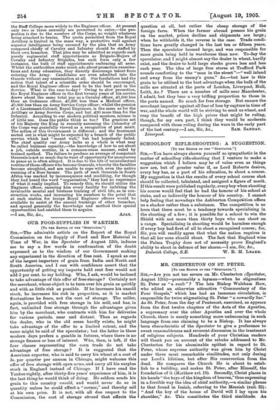[To THE EDITOR OF THE "SPECTATOR:]
Sin,—The admirable article on the Report of the Royal Commission on the Supply of Food and Raw Material in Time of War, in the Spectator of August 12th, induces me to say a few words in confirmation of the doubt expressed as to the wisdom of our Government making any experiment in the direction of free rent. I speak as one of the largest importers of grain from India and North and South America, and I can with confidence assert that the opportunity of getting my imports held rent free would not add 5 per cent, to my holding. Who, I ask, would be inclined to take advantage of this offer of free storage ? Certainly not the merchant, whose object is to turn over his grain as quickly and with as little risk as possible. If he increases his unsold stock, he increases his risk in proportion, as it is market fluctuations he fears, not the cost of storage. The miller, again, is provided with free storage in his mill, and has, in fact, unlimited free storage through the advantages given him by the merchant, who contracts with him for deliveries for various periods, near and distant. Then as regards the dealer, who in the old sense hardly exists, he might take advantage of the offer to a limited extent, and the same might be said of the speculator; but the latter in these modern days prefers a gamble in futures, where there is no storage finance or loss of interest. Who, then, is left, if the four classes representing the corn trade do not take advantage of free storage ? It is suggested that the American exporter, who is said to carry his wheat at a cost of 3s. per quarter per annum in Chicago, might welcome this offer of free storage with open arms, and carry all his surplus stock in England instead of Chicago. If I have read the Yankee rightly, after thirty-five years' experience of him, it is the last thing he would think of doing. He seldom sends his grain to this country unsold, and would never do so in quantity unless he could effect a "corner," and thereby sell at his own price. It is not, with all due respect to the Commission, the cost of storage abroad that affects the question at all, but rather the cheap storage of the foreign farm. When the farmer abroad presses his grain on the market, prices decline and shipments are large ; when he withholds it, the reverse is the case. Trade condi- tions have greatly changed in the last ten or fifteen years. Then the speculator loomed large, and was responsible for more grain being held in warehouse than now. To-day the speculator, and I might almost say the dealer in wheat, hardly exist, and the desire to hold large stocks grows less and less each year. The idea of large free stores at Trafford Park sounds comforting to the "man in the street "—"well inland and away from the enemy's guns," &c.—but how is this grain to be utilised to the best advantage when the bulk of the mills are situated at the ports of London, Liverpool, Hull, Leith, &c. ? There are a number of mills near Manchester, I admit, but they bear a very trifling proportion to those in the ports named. So much for free storage. But ensure the merchant importer against all fear of loss by capture in time of war, and the whole world will be striving to send us wheat, and reap the benefit of the high prices that might be ruling, though, for my own part, I think they would be moderate compared with those ruling during the wars in the early part of the last century.—I am, Sir, &c., SAM. SANDAY. Liverpool.


































 Previous page
Previous page